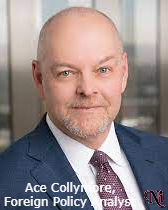Ace Collymore,
Foreign Policy Analyst, Canada

President Joe Biden departs on a six-day trip to South Korea and Japan aiming to build rapport with the two nations’ leaders while also sending an unmistakable message to China: Russia’s faltering invasion of Ukraine should give Beijing pause about its own sabre-rattling in the Pacific.
Mr. Biden departs on May 19 and is set to meet newly elected South Korean President Yoon Suk Yeol and Japanese Prime Minister Fumio Kishida. Their talks will touch on trade, increasing resilience in the global supply chain, growing concerns about North Korea’s nuclear program, and the explosive spread of COVID-19 in that country.
The visit will be another opportunity for Biden to showcase the global solidarity he’s helped build for Ukraine and to repeat his often-argued case for democracy over authoritarianism.
That message, delivered from the thriving democracies of South Korea and Japan, will be aimed at China, whose growing economic and military prowess makes it – in the view of the administration – the only country capable of seriously disrupting the international system.
In a possible attempt to cause its own disruption, North Korea could launch a missile or nuclear test during Biden’s trip to the region.
“We are preparing for all contingencies,” Jake Sullivan, Biden’s national security adviser, said Wednesday , May 18.
In addition to reassuring Indo-Pacific allies that his attention has not strayed, Biden will try to strengthen an economic alliance with the region. But the political unpopularity in the U.S. of trade deals has forced the administration to turn to a different type of agreement – and it’s unclear how it will be received.
Along with reassuring Indo-Pacific allies that his consideration has not strayed, Biden will attempt to strengthen a financial alliance with the area. However the political unpopularity within the U.S. of commerce offers has compelled the administration to show to a distinct sort of settlement – and its unclear how will probably be acquired.
Nonetheless, Biden could have a greater mixture of leaders in Japan and South Korea to work with than his current predecessors have had. And he’s touring on the tailwinds of the unity round Ukraine and a just-completed summit in Washington with Southeast Asian nations.
“I think you’ll see some statements from the president that go right at that little bit of uncertainty about our ability to – not our intentions, really, but our ability to handle, major challenges in Europe and Asia at the same time,” said Michael J Green, who worked on Asian affairs in the George W. Bush administration.
Tomita Koji, Japan’s ambassador to the United States, said Biden’s visit will send the message that the U.S. is not distracted.
“It sends a powerful signal that the United States stays focused on the Indo-Pacific region at the time when people are preoccupied with the situation in Ukraine,” Tomita said at a recent Center for Strategic and International Studies event.

